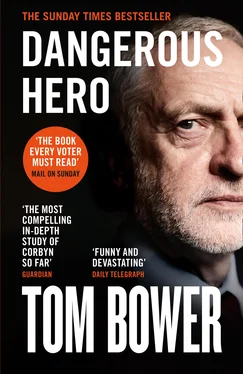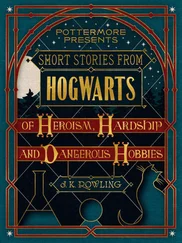Reg Race had helped him realise his first political dreams in the early 1970s. Ever since, Corbyn had trusted his advice, especially once his friend became the financial supremo at the Greater London Council (GLC) during Ken Livingstone’s turbulent reign in the 1980s. But as they forged a bond on the left of the Labour Party, Race had discovered Corbyn’s ignorance about the bureaucratic requirements of government, and his simple-mindedness about finances. While the committed revolutionary strove to challenge powerbrokers across the world on behalf of the oppressed, he seethed about any personal criticism in his own home. With so much to hide, he condemned any revelations about himself as abhorrent.
However, on the day in 1996 on which Race described Corbyn’s financial crisis, the focus was entirely on him. Even if a rich benefactor had volunteered to pay off all the debts (and that was improbable), he would soon have fallen behind again. He had little choice, Race told him, but to sell the family home. Claudia agreed. Reluctantly, so did Corbyn – and thereafter broke off his relations with Race. The messenger was to blame. After this experience, Race questioned Corbyn’s character and his propriety to influence the direction of the Labour movement.
In early 1999 the Corbyns’ home was sold for £365,000 (£730,000 today), and they downsized to a house in Mercers Road, a shabby street in Tufnell Park, off the Holloway Road. On the day of the move, Corbyn was told by Claudia to empty the fridge. He forgot. He also forgot to clear the garage. Late in the afternoon, while their former home’s new owner, dressed in a camelhair coat, fumed on the pavement, the garage door was opened to reveal rubbish crammed to the ceiling. Corbyn had regularly picked wood from neighbourhood skips, and also collected railway junk as he criss-crossed the country on trains. Boxes of safety lamps, metal signs, track signals and other paraphernalia had been stuffed in any old how. Late in the day, everything was finally shuttled across to the basement of Mercers Road, creating a new world of clutter.
The move brought one advantage. The building had been converted into bedsits, making the estrangement between Claudia and Corbyn easier. She and their three sons took the top floors, where she lived with a young South American dubbed ‘the toy boy’, while Corbyn, in the basement, had relationships with a series of younger women.
The couple’s estrangement was kept secret for almost two years. Late in 1999, while Corbyn was at a peace conference in The Hague, a journalist contacted Claudia and asked whether the two had separated. Instead of telling the complete truth, she explained that their twelve-year marriage had ended in 1997. She said that she had wanted their eleven-year-old son Ben to go to Queen Elizabeth’s grammar school in Barnet, but that Corbyn had stipulated that he should go instead to Holloway School, a local comprehensive notorious for achieving, for three successive years, the worst GCSE results in the country, and listed as ‘failing’ by Ofsted, the office for standards in education.
From The Hague, Corbyn confirmed Claudia’s account. Defending his ideological purity against selective schools, he implied, was more important than his son’s education – or his marriage. To avoid being branded a hypocrite, he said he preferred his son to be badly educated than to be given an unfair advantage. Labour’s Islington council, he knew, despite receiving additional government funds, had failed to improve Holloway. The school was plagued with discipline problems and classes in which up to twenty languages were spoken, the white pupils being especially disadvantaged.
In a series of interviews, Claudia reinforced the same message. ‘My children’s education is my absolute priority, and this situation left me with no alternative but to accept a place at Queen Elizabeth Boys’ School. I had to make the decision as a mother and a parent … It isn’t a story about making a choice, but about having no choice. I couldn’t send Ben to a school where I knew he wouldn’t be happy.’ To the public Corbyn appeared to have acquiesced in his wife’s wishes, but, like so many communists, he had put his political principles first, and ended the marriage: he could not live with a woman who did not accept his beliefs. The only dent to that image of ideological purity was Claudia’s revelation that Corbyn had agreed for another of their sons to spend two years at the local Montessori nursery, at £600 per term.
If that had been the last word on the subject, the notion that the marriage had broken up over Corbyn’s principles might have been plausible. He favoured, he said, France’s strict laws on the privacy of public figures’ family lives – laws which have been exploited to conceal rampant corruption among French politicians, including former presidents. But Claudia, possibly with Corbyn’s encouragement, went further. ‘He is first the politician and second the parent,’ she said. ‘He definitely felt it would have compromised his career if he had made the same choice that I did. It’s very difficult when your ideals get in the way of family life … It has been a horrendous decision.’
Sixteen years later, the whole tale was expanded. Rosa Prince, Corbyn’s semi-authorised biographer, described, with Bracchitta’s help, a tormented family: ‘Corbyn and Bracchitta went round and round in circles for months. She would not send Ben to Holloway School and Corbyn could not bear for him to go to Queen Elizabeth’s … In choosing Queen Elizabeth’s, Bracchitta was aware that she was ending her marriage … Once again, Corbyn had put politics above his relationship.’ That version is clearly incorrect. The marriage ended because of Corbyn’s behaviour – his financial incompetence, his thoughtless absences, his neglect of his family and his apparent misogyny. ‘He told me that the marriage had ended long before the school bit,’ Ken Livingstone recalled. ‘We had a chat at the time and he said his marriage had fallen apart over other things, not the school.’ Like Reg Race, Livingstone had discovered that Corbyn’s ‘authenticity’ was fictitious – a confection for political appearances. He had posed as a man who refused to sell out, albeit he was never heard to advocate higher standards of teaching.
The posturing became even more apparent in July 2016, one year after Corbyn became Labour’s leader. He appeared in a televised interview with the novelist and poet Ben Okri. The premise was Corbyn’s love of literature, but this was totally fabricated. He had only ever read very little. Equally misleading was his declaration: ‘You have to be honest with people. You have to say what you believe to be the truth. If you hide the truth you are very dishonest.’
Up to the present day, Corbyn has concealed or distorted the nature of his close relationships, his personal life and his prejudices. The communists understood the value of those Lenin called ‘useful idiots’ – the well-intentioned idealists in the West who blindly supported the Soviet agenda. Lenin also mastered one critical ruse to grab public support. ‘A lie told often enough,’ he said, ‘becomes the truth.’ He had gone on to adopt Dostoyevsky’s wise observation in Crime and Punishment : ‘They lie and then worship their own lies.’ Considering his long involvement with Corbyn before his ambition to lead Britain materialised, in 2018 Reg Race made a measured judgement about his former friend. Realising that Corbyn was guilty of that same deception, he concluded, ‘He’s not fit to be leader of the Labour Party, and not fit to be Britain’s prime minister.’
The Corbyns could trace their roots in England back to the eighteenth century and beyond. Farmers, priests, a tailor, a chemist and a solicitor conformed to a traditional middle-class background which in 1915 produced David Corbyn. David met his future wife Naomi Josling in 1936, at a meeting about the Spanish Civil War, when both were twenty-one-year-old students at London University. Naomi was studying science.
Читать дальше










